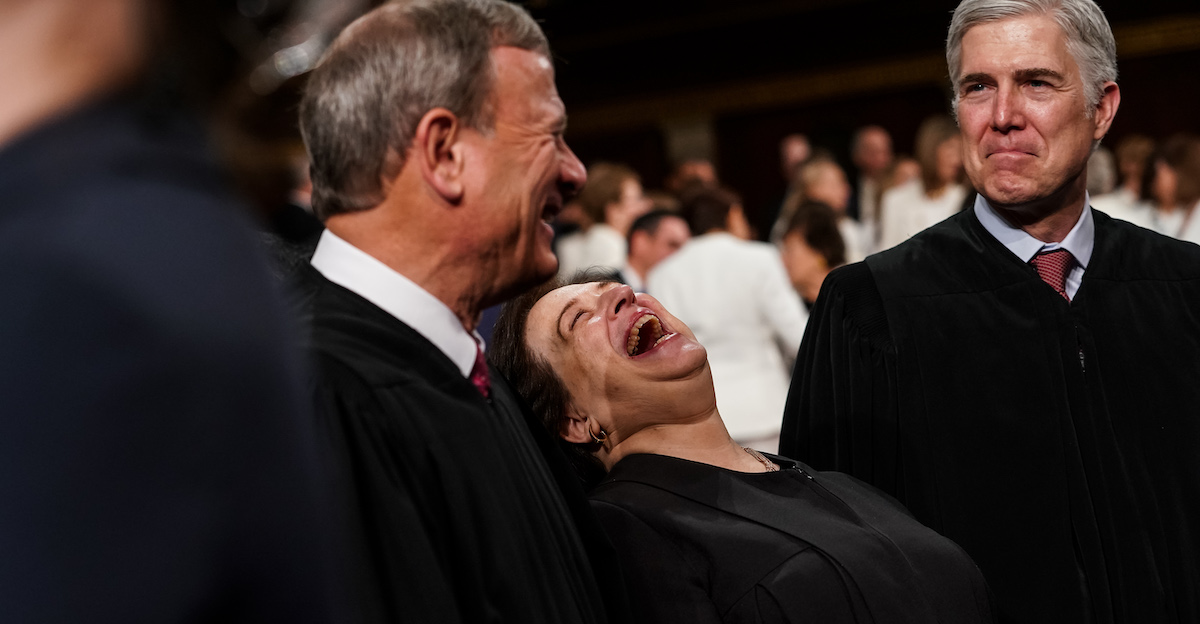
When the Supreme Court of the United States handed down its ruling in Ramos v. Louisiana on Monday, many were unprepared to see liberal Justice Elena Kagan side with Justice Samuel Alito’s dissent along with Chief Justice John Roberts.
At issue in the case was a Louisiana criminal procedure rule (as well as a similar one in Oregon) that allows criminal defendants to be convicted of a serious offense by a jury vote of 10 to 2 – instead of the usual requirement for unanimity. Part of the majority’s lengthy analysis centered around the rules’ history, which had been rooted in racism.
Justice Neil Gorsuch, writing for the majority, called out non-unanimous jury rules for being engineered to nullify the votes of black jurors. Gorsuch wrote that the origins of the rules were clearly tied to white supremacy, and included many trappings of Jim Crow. Gorsuch explained that the rule was adopted “with a careful eye on racial demographics.” Gorsuch said it was designed to appear facially-neutral in an effort “to ensure that African-American juror service would be meaningless.”
The dissenting trio, however, wouldn’t hear any of these accusations. Alito accused the majority of raising racism as nothing more than an ad hominem attack on Louisiana:
“If Louisiana and Oregon originally adopted their laws allowing non-unanimous verdicts for these reasons, that is deplorable, but what does that have to do with the broad constitutional question before us? The answer is: nothing.”
The dissent went a step further, criticizing the majority for “mak[ing] no effort” to show that the non-unanimous jury rules were retained for legitimate non-racist purposes.
Alito raised the example of British Parliamentary and Puerto Rican laws that also allowed non-unanimous verdicts; those rules were made to ensure fairness and efficiency, not to silence black jurors.
“Was their aim to promote white supremacy? And how about the prominent scholars who have taken the same position? Racists all? Of course not,” Alito wrote. Then came a footnote:
“Among other things, allowing non-unanimous verdicts prevents mistrials caused by a single rogue juror, that is, a juror who refuses to pay attention at trial, expressly defies the law, or spurns deliberation. When unanimity is demanded, the work of preventing this must be done in large measure by more intensive voir dire and more aggressive use of challenges for cause and peremptory challenges.”
Alito accused his colleagues in the majority of going out of their way to focus on racism, thereby engaging in irrational and uncivil discourse:
“So all the talk about the Klan, etc., is entirely out of place. We dissenting should set an example of rational and civil discourse instead of contributing to the worst current trends.”
Some court followers weren’t surprised to see Roberts and Alito taking this stance, but Kagan? They evidently didn’t see that coming and were taken aback.
Responses ranged from the confused:
Why is Kagan on the wrong side of this?
— LambdaHard (@LambdaHard) April 20, 2020
…to the disappointed:
Note that the dissent – which Justice Kagan signed!! – chides the majority for its “ad hominem rhetoric” and for violating norms of civil discourse by mentioning the racist history of nonunanimous juries. That says so much. The Court often values politeness over truth. pic.twitter.com/ugVLkuuR2u
— David Menschel (@davidminpdx) April 20, 2020
Elena Kagan joining a dissent from Alito that excuses/ignores the racist history of non-unanimous jury trials is… not a good look.
— bengarmoe (@bengarmoe) April 20, 2020
This is a huge Sixth Amendment victory, even though only Louisiana and Oregon have non-unanimous verdicts right now.
Really disappointing, though, to see where Kagan is at.
— Chris Geidner (@chrisgeidner) April 20, 2020
… to the resigned:
Please note that Kagan joined this portion of Alito’s dissent, and make of that what you will.
— Mark Joseph Stern (@mjs_DC) April 20, 2020
Note from lawyer spouse: “Kagan, still a prosecutor.” https://t.co/gtBSV9oS06
— Chanda #COLA4ALL Prescod-Weinstein (@IBJIYONGI) April 20, 2020
Some are determined to see the best in the justices, pointing out that Kagan’s having sided with two of the court’s conservative justices indicates a desired neutrality on the bench.
For those who think the SC is always partisan, check out the breakdown.
Majority: Gorsuch, Ginsburg, Breyer, Thomas, Sotomayor, Kavanaugh
Dissent: Riberts, Alito, Kagan https://t.co/bfB77MMzPc
— MNPoliticoTony (@NationalOur) April 20, 2020
So much for “SC balkanization:” Alito (far right) and Kagan (moderate left) on same side as Roberts (moderate right.) Kavanaugh (moderate right) Sotomayor (far left) Ginsberg (far left) Breyer (moderate left) Thomas (farthest right) and Gorsuch (far right) together. Got that? https://t.co/gBCpsELJ5P
— Christine Flowers (@flowerlady61) April 20, 2020
[image via Doug Mills/The New York Times POOL PHOTO]
Have a tip we should know? [email protected]